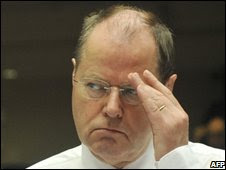
Germany's finance minister has strongly criticised Gordon Brown's plans for reviving the UK economy, describing them as a "breathtaking" and "crass".
But sources close to the British government hit back, saying Berlin was "out of step" with most nations on how to handle the crisis.
Peer Steinbruck had criticised the UK's decision to cut VAT and raise the national debt to record levels.
His attack came as EU leaders gathered for an economic summit in Brussels.
The two-day meeting has been billed as one of the most important summits for years.
Diplomatic breach
French President Nicholas Sarkozy, who will be chairing the talks, said in a letter to fellow leaders: "We shall be required to take a series of decisions with highly significant implications for the future of Europe."
Germany is less than happy with the direction being taken in the UK, and was expected at the summit to question the European Commission's recovery package along similar lines.
Mr Steinbruck's comments, in an interview with Newsweek magazine, represented an unusual breach of diplomatic conventions.
He questioned the effectiveness of the decision to cut VAT from 17.5% to 15%.
"Are you really going to buy a DVD player because it now costs £39.10 instead of £39.90?" he said.
"All this will do is raise Britain's debt to a level that will take a whole generation to work off."
'Tossing around billions'
Mr Steinbruck questioned why Britain was "tossing around billions" and closely following the high public spending model put forward by 20th Century economist John Maynard Keynes.
"The switch from decades of supply-side politics all the way to a crass Keynesianism is breathtaking," he said.
Shadow chancellor George Osborne said the comments shattered Labour's charge that only the Conservatives oppose the VAT measures.
BBC political correspondent Jo Coburn said sources close to Downing Street and the Treasury were unhappy about the comments.
But she said they dismissed them by saying that Germany "was in a minority position and out of step with most other countries on how to deal with the looming recession".
Downing Street also pointed out that Germany has already introduced its own package of extra spending.
Chancellor Alistair Darling announced in last month's pre-Budget report that the government would inject an extra £20bn into the UK economy in a bid to get it moving again.
Rescue package
And combined with the impact of the downturn on tax receipts, the chancellor said that the UK's total annual public sector deficit would soar to £118bn next year.
While Mr Steinbruck has accused the UK of over-spending on the economic recovery, the German government has put 480bn euros (£370.4bn; $645bn) into a rescue package for its banks.
Most other European governments have also increased public spending to try to ease the impact of the economic downturn.
France recently announced plans to spend 26bn euros, and the European Commission wants to spend 200bn euros across the European Union.
A Treasury spokesman said: "There is a broad international consensus that a fiscal stimulus is the right thing for economies now."









